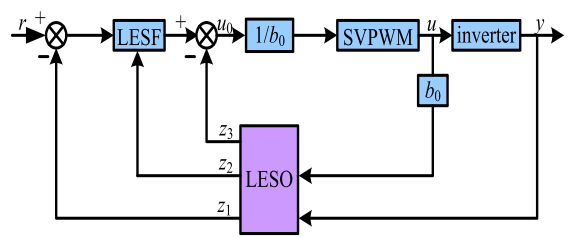Objective
The main objective of the proposed method is to improve the stability of the DC side voltage of the direct-drive permanent magnet wind power grid-connected inverter by using First-Order LADRC
Abstract
The improved linear active disturbance rejection controller (LADRC) controls the voltage outer loop. Firstly, the mathematical model of the wind power grid-connected inverter is analyzed, on this basis, a linear active disturbance rejection control based on the reduced-order linear extended state observer is designed, reduce the phase lag of the observer, improve the system’s disturbance observation accuracy; reference lead correction lag correction method, the observer gain is improved and connected in series to the total disturbance channel to reduce the noise amplification effect of the observer; through frequency domain response characteristic analysis, the results show that the improved LADRC has better disturbance rejection performance. The simulation results of various working conditions show that the improved method has better rapidity and immunity compared with traditional LADRC.
Keywords: Grid inverter, linear active disturbance rejection control, linear extended state observer, lead and lag link, frequency domain analysis.
NOTE: Without the concern of our team, please don't submit to the college. This Abstract varies based on student requirements.
Block Diagram

Specifications
Software Configuration:
Operating System : Windows 7/8/10
Application Software : Matlab/Simulink
Hardware Configuration:
RAM : 8 GB
Processor : I3 / I5(Mostly prefer)
Learning Outcomes
- Introduction to Matlab/Simulink
- What is EISPACK & LINPACK
- How to start with MATLAB
- About Matlab language
- About tools & libraries
- Application of Matlab/Simulink
- About Matlab desktop
- Features of Matlab/Simulink
- Basics on Matlab/Simulink
- Introduction to controllers.
- Study of PWM techniques.
- Project Development Skills:
- Problem analyzing skills
- Problem solving skills
- Creativity and imaginary skills
- Programming skills
- Deployment
- Testing skills
- Debugging skills
- Project presentation skills
- Thesis writing skills


 Paper Publishing
Paper Publishing
